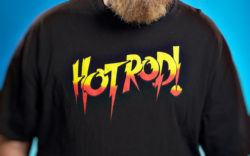“My whole goal is to make people happy.” This is how Mark Weathersby, known by his fans as DJ Mahogany, describes his approach to performing. “I know this might sound weird, but a person once told me if you’re happy, then everyone else around you is gonna be happy. I like to make crowds smile in whatever way I can.”
Mahogany is one of the most popular and recognizable DJs in Athens. His weekend residency at Little Kings Shuffle Club regularly packs out the venue, and his name has become synonymous with “dance party” among locals young and old. In the light of day, Weathersby is humble, soft-spoken and borderline shy, but during his late-night sets, he’s a force to be reckoned with—a boisterous and lively master of the stage whose crowd control is second to none.
The Athens DJ scene is varied. There are plenty who cater to large crowds by playing Top 40 hits and popular ’90s tunes. Others focus on experimental mixes or dig deep into obscure jams from the past. Some, like Weathersby, try to find a nice balance between the many types of DJ styles. In an attempt to assess the current state of Athens’ DJ culture, Flagpole contacted several local performers. This is what they had to say.
Split Scene
“I think there are two DJ scenes going on simultaneously,” says Ben Bradberry, aka DJ Reindeer Games. “I think there is the older scene that caters more to the dance party crowd that has people coming out regardless of who is spinning because they want to dance and have a good time. At the same time, I think there is a newer, younger scene where DJs are trying harder to have their own sound that people will specifically come out to see.”
One person who is definitely forming his own unique sound is local producer and DJ Dillon McCabe, who goes by the name Stay at Home Dad on stage and online.
“Despite the fact that I’ll play 50–60 percent original material during a DJ set, I find that DJ sets draw more public interest than an ‘electronic’ show,” says McCabe. “It appeared very quickly that advertising my electronic sets more like I was DJing an event got more people interested in what I was doing.”
For a younger, up-and-coming act, that inherent split can be frustrating. While McCabe considers himself to be in a good spot at the moment, he thinks there is a lot of room for improvement. “Events like Chris Rogero’s emo nights and anything thrown by the Booty Boyz prove that successful events are possible, but it also shows that maybe people show up for the event as a whole and not necessarily for whoever is playing.”
McCabe’s sentiment about the event being a bigger draw than the DJ was a common complaint among DJs contacted for this piece. Even Weathersby, whose name certainly holds a lot of weight around town, occasionally finds himself in situations where, if people don’t feel like they’re going to get a dance party, the big crowds might not show up.
Wuxtry employee Nate Mitchell, who DJs as Nate From Wuxtry, is not a fan of the more popular DJ nights that draw big crowds by playing well-known hits.
“I look for DJs who expose me to stuff that is new, unconventional, obscure, rare and unusual,” says Mitchell. “My personal taste tends to gravitate more towards the ’50s, ’60s and ’70s. There are a handful of DJs who I try to support whenever possible. People like Kurt Wood, Wyatt Nicholson, Tony Chackal, Phillip Jaggar and also people like Troy Hicks that are more disco [or] house-music oriented, as well as plenty of others. [They] rarely get the big crowds, but they persevere because they have a genuine love of music. I guess I would lump myself into that category.”
For Weathersby, it’s all about studying different crowds at different venues and preparing accordingly.
“I’ve always been the type of person who adheres to the crowd on the dance floor,” he says. “At Little Kings, I definitely play more Top 40, hip hop, rap, trap type of stuff. They may wanna hear Fetty Wap, Desiigner, nothing but the hits. If you try to throw in a deep cut there, you might get eggs thrown at you.”
In contrast, he says, “[Go Bar is] one of my favorite places to DJ. When I’m there, I can play more disco, more new wave, more stuff from the ’80s, ’70s, ’60s. It’s still a pretty young crowd, but it’s a crowd who is more underground and unique. Their minds are a little more open; they want to hear more than just the hits. It’s a wonderful thing that we still have groups who want to expand their musical knowledge.”
One of Weathersby’s favorite local DJs is John Bailey, aka DJ Osmose. Bailey crafts his sets using exclusively vinyl records, a sight that has become rarer since the advent of digital DJ equipment. After getting his Athens start a little over two years ago, when Weathersby and Mitchell put him in touch with their venue contacts, Bailey has made a notable impact on the scene, though he wishes there were more opportunities.
“In the two years I’ve been here, I’ve surmised that Athens is a very band and singer-songwriter-centric town,” says Bailey. “There’s certainly nothing wrong with that, but there’s lots of room for DJ culture to grow.”
Similar to McCabe, Bailey is hopeful that local crowds will become more understanding of the artistry that comes with performing.
“While the rise of the digital-based DJ has let more folks into the game, it has also created a smoke screen as far as people accepting the art form of DJing,” he says. “When the average person sees someone just staring at a computer, it doesn’t appear to them that there is any artistry, and sometimes that can be true. There is an art form [in] song selection, beat matching, cutting, juggling or even more in-the-box, computer-based DJing with the use of effects and filtering.”
What’s Next?
If there’s one thing almost none of the DJs interviewed for this article had similar thoughts on, it’s the ultimate future of the Athens DJ scene. Some, like Bradberry, are hopeful. “I think the scene is in very good hands moving forward,” he says. “I’m a big fan of a lot of the DJs in town, and I am also motivated and inspired by them.”
McCabe also has a positive outlook, but with more of an emphasis on reforming relationships between artists and venues.
“I think the scene has visibly improved, even in my short time being a part of it,” he says. “Looking at some of the shows, like [DJ My Chemical Bromance’s] emo night or the Booty Boyz’ ‘versus’ series, proves that a cool idea can come to fruition with good promotion and support from the venues. Also, I can’t not mention the help that Kai [Riedl] and the Slingshot team, as well as Gordon [Lamb] and the Athens Intensified team, have done to support the validity of DJs and electronic acts in the public’s eye recently.”
Mitchell is slightly more critical of where the DJ scene—and Athens itself—may be headed.
“It’s hard to say what the future will bring. There’s always a possibility that new blood yielding new talent will arise, but I think it would take a lot to build anything up to Krush Girls-level of a DJ night packing out a club the size of the 40 Watt,” he says, referring to the local DJ supergroup that played to sold-out crowds in the mid-2000s.
“I expect the bigger shows will continue to be the established touring acts, rather than something homegrown,” Mitchell continues. “Taste-wise, Athens is feeling increasingly suburban to me, and I don’t really see it changing [or] improving anytime soon.”
As for Weathersby, he doesn’t think so much about what the future will bring. To him, the Athens DJ scene has always been and will always be a place of comfort, regardless of who is onstage.
“I think things will remain relatively the same, as they have for years,” he says. “You’ll always have a handful of new DJs coming up playing fun music for everyone to dance to. Mark Wallace, who owns Go Bar, used to tell me about how he would do Monday-night disco at the 40 Watt in the ’80s, and the line would be down the block. They would pack it out, people would dance naked on stage, it was amazing.
“No matter how big the crowds are nowadays,” he continues, “I think that spirit is still there, and I hope things will stay on that wave as we march forward.”
Like what you just read? Support Flagpole by making a donation today. Every dollar you give helps fund our ongoing mission to provide Athens with quality, independent journalism.










